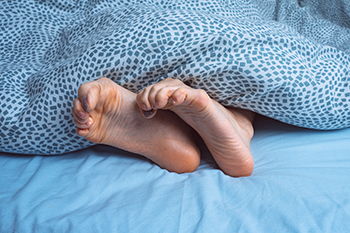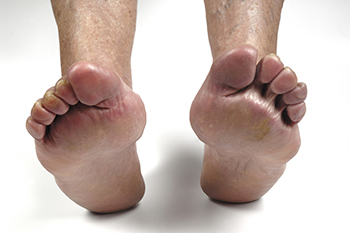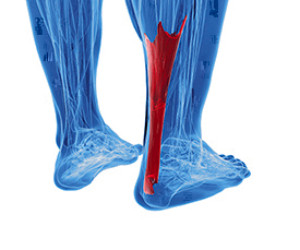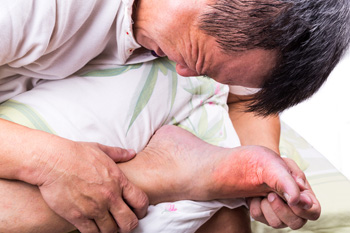Items filtered by date: September 2023
Extensor Tendonitis

Extensor tendonitis in the feet can occur due to overuse, resulting in pain and discomfort. Extensor tendons play crucial roles in the movement of toes but are vulnerable to injuries. Foot extensor tendonitis typically presents as pain on the top of the foot, often affecting one foot more than the other. It can weaken the tendons, affecting toe movement and push-off ability. Common causes of this condition include wearing tight shoes and running excessively. Diagnosis involves having physical exams and, in some cases, imaging tests such as X-rays, ultrasounds, or an MRI. Treatment includes rest, stretching, and strengthening exercises. Steroid injections may be necessary for severe cases, with surgery reserved for rare instances. Recovery times can vary. Proper care and prevention can effectively manage extensor tendonitis, allowing a return to regular activities. If you think you may have this affliction, it is suggested that you make an appointment with a podiatrist for a proper diagnosis and treatment.
Toe pain can disrupt your daily activities. If you have any concerns, contact one of our podiatrists of William Street Podiatry. Our doctors can provide the care you need to keep you pain-free and on your feet.
What Causes Toe Pain?
Most severe toe pain is caused due to a sports injury, trauma from dropping something heavy on the toe, or bumping into something rigid. Other problems can develop over time for various reasons.
Toe pain can be caused by one or more ailments. The most common include:
- Trauma
- Sports injury
- Wearing shoes that are too tight
- Arthritis
- Gout
- Corns and calluses
- Hammertoe
- Bunions
- Blisters
- Ingrown toenails
- Sprains
- Fractures (broken bones)
- Dislocations
When to See a Podiatrist
- Severe pain
- Persistent pain that lasts more than a week
- Signs of infection
- Continued swelling
- Pain that prevents walking
Diagnosis
In many cases the cause of toe pain is obvious, but in others, a podiatrist may want to use more advanced methods to determine the problem. These can range from simple visual inspections and sensation tests to X-rays and MRI scans. Prior medical history, family medical history, and any recent physical traumatic events will all be taken into consideration for a proper diagnosis.
Treatment
Treatments for toe pain and injuries vary and may include shoe inserts, padding, taping, medicines, injections, and in some cases, surgery. If you believe that you have broken a toe, please see a podiatrist as soon as possible.
If you have any questions please feel free to contact one of our offices located in William Street in New York, NY, Forest Hills, NY, and Broadway in New York, NY . We offer the newest diagnostic tools and technology to treat your foot and ankle needs.
Ways Arthritis Affects the Toes

Arthritis is an inflammatory condition that can have a profound impact on joints in the body, including the toes. The two forms of arthritis that affect the toes are osteoarthritis and rheumatoid arthritis. Osteoarthritis is often a result of wear and tear on the joints, where the protective cartilage at the ends of bones gradually deteriorates. When this occurs in the toes, it can lead to pain, stiffness, and a reduced range of motion. Walking and performing everyday tasks can become difficult. In contrast, rheumatoid arthritis is an autoimmune disorder in which the immune system mistakenly attacks the joints, including those in the toes. This autoimmune response triggers inflammation and swelling, and can even lead to deformities in the affected toes. Over time, the toe joints may suffer significant damage, further diminishing their functionality. This may cause chronic pain and mobility issues that can affect overall foot health. Basic activities such as walking, standing, or even wearing certain types of shoes can become challenging and painful. To address these issues effectively, it's suggested that you make an appointment with a podiatrist. This foot doctor can provide an accurate diagnosis, create a personalized treatment plan, and offer advice on managing symptoms.
Arthritis can be a difficult condition to live with. If you are seeking treatment, contact one of our podiatrists from William Street Podiatry. Our doctors can provide the care you need to keep you pain-free and on your feet.
Arthritic Foot Care
Arthritis is a term that is commonly used to describe joint pain. The condition itself can occur to anyone of any age, race, or gender, and there are over 100 types of it. Nevertheless, arthritis is more commonly found in women compared to men, and it is also more prevalent in those who are overweight. The causes of arthritis vary depending on which type of arthritis you have. Osteoarthritis for example, is often caused by injury, while rheumatoid arthritis is caused by a misdirected immune system.
Symptoms
- Swelling
- Pain
- Stiffness
- Decreased Range of Motion
Arthritic symptoms range in severity, and they may come and go. Some symptoms stay the same for several years but could potentially get worse with time. Severe cases of arthritis can prevent its sufferers from performing daily activities and make walking difficult.
Risk Factors
- Occupation – Occupations requiring repetitive knee movements have been linked to osteoarthritis
- Obesity – Excess weight can contribute to osteoarthritis development
- Infection – Microbial agents can infect the joints and trigger arthritis
- Joint Injuries – Damage to joints may lead to osteoarthritis
- Age – Risk increases with age
- Gender –Most types are more common in women
- Genetics – Arthritis can be hereditary
If you suspect your arthritis is affecting your feet, it is crucial that you see a podiatrist immediately. Your doctor will be able to address your specific case and help you decide which treatment method is best for you.
If you have any questions, please feel free to contact one of our offices located in William Street in New York, NY, Forest Hills, NY, and Broadway in New York, NY . We offer the newest diagnostic and treatment technologies for all your foot care needs.
Are Bunions Affecting Your Everyday Life?
Common Achilles Tendon Injuries

The Achilles tendon connects the calf muscles to the heel bone and plays a vital role in everyday movements. It allows you to perform actions like rising up on the toes, walking, and running. Despite its strength, the Achilles tendon is susceptible to various injuries that can be painful and debilitating. Achilles tendinopathy, also known as Achilles tendonitis, involves tiny tears in the tissue surrounding the tendon. These are often caused by overuse. Symptoms include pain, swelling, tenderness, morning stiffness, and decreased strength and movement in the affected leg. An Achilles tendon tear or rupture is a more severe injury that can result in sudden, sharp pain, swelling, bruising, and a loss of function, making it difficult to point the foot downward or stand on the toes. Some patients with partial tears may not experience noticeable symptoms. It's important to note that Achilles tendon issues often develop gradually due to cumulative damage. If you suspect you have incurred an Achilles tendon injury, it is suggested that you make an appointment with a podiatrist for the most suitable treatment approach for dealing with your injury.
Achilles tendon injuries need immediate attention to avoid future complications. If you have any concerns, contact one of our podiatrists of William Street Podiatry. Our doctors can provide the care you need to keep you pain-free and on your feet.
What Is the Achilles Tendon?
The Achilles tendon is a tendon that connects the lower leg muscles and calf to the heel of the foot. It is the strongest tendon in the human body and is essential for making movement possible. Because this tendon is such an integral part of the body, any injuries to it can create immense difficulties and should immediately be presented to a doctor.
What Are the Symptoms of an Achilles Tendon Injury?
There are various types of injuries that can affect the Achilles tendon. The two most common injuries are Achilles tendinitis and ruptures of the tendon.
Achilles Tendinitis Symptoms
- Inflammation
- Dull to severe pain
- Increased blood flow to the tendon
- Thickening of the tendon
Rupture Symptoms
- Extreme pain and swelling in the foot
- Total immobility
Treatment and Prevention
Achilles tendon injuries are diagnosed by a thorough physical evaluation, which can include an MRI. Treatment involves rest, physical therapy, and in some cases, surgery. However, various preventative measures can be taken to avoid these injuries, such as:
- Thorough stretching of the tendon before and after exercise
- Strengthening exercises like calf raises, squats, leg curls, leg extensions, leg raises, lunges, and leg presses
If you have any questions please feel free to contact one of our offices located in William Street in New York, NY, Forest Hills, NY, and Broadway in New York, NY . We offer the newest diagnostic tools and technology to treat your foot and ankle needs.
Medicines That Help Prevent Gout

Gout, a form of arthritis, is characterized by painful joint swelling due to a buildup of uric acid in the bloodstream. It often affects the big toe as well as other joints. Failing to address gout can lead to lasting joint damage. Treatment for gout involves lifestyle adjustments, including alcohol avoidance and weight management, along with medication. During acute attacks, non-steroidal anti-inflammatory drugs, NSAIDs, can alleviate pain and swelling, though they don't impact uric acid levels. Corticosteroids, taken orally or injected into affected joints, also offer relief. Colchicine, an alternative to NSAIDs, lessens inflammation if taken early. To prevent future gout occurrences, medications are used to lower uric acid levels in the body. Xanthine oxidase inhibitors limit uric acid production, while uricosuric medicines increase its elimination via urine. It is important to be aware of the adverse effects of any medication. For help with the management of gout, it is suggested that you keep in communication with a podiatrist, who is specifically trained to deal with such problems.
Gout is a painful condition that can be treated. If you are seeking treatment, contact one of our podiatrists from William Street Podiatry. Our doctors will treat your foot and ankle needs.
What Is Gout?
Gout is a form of arthritis that is characterized by sudden, severe attacks of pain, redness, and tenderness in the joints. The condition usually affects the joint at the base of the big toe. A gout attack can occur at any random time, such as the middle of the night while you are asleep.
Symptoms
- Intense Joint Pain - Usually around the large joint of your big toe, and it most severe within the first four to twelve hours
- Lingering Discomfort - Joint discomfort may last from a few days to a few weeks
- Inflammation and Redness -Affected joints may become swollen, tender, warm and red
- Limited Range of Motion - May experience a decrease in joint mobility
Risk Factors
- Genetics - If family members have gout, you’re more likely to have it
- Medications - Diuretic medications can raise uric acid levels
- Gender/Age - Gout is more common in men until the age of 60. It is believed that estrogen protects women until that point
- Diet - Eating red meat and shellfish increases your risk
- Alcohol - Having more than two alcoholic drinks per day increases your risk
- Obesity - Obese people are at a higher risk for gout
Prior to visiting your podiatrist to receive treatment for gout, there are a few things you should do beforehand. If you have gout you should write down your symptoms--including when they started and how often you experience them, important medical information you may have, and any questions you may have. Writing down these three things will help your podiatrist in assessing your specific situation so that he or she may provide the best route of treatment for you.
If you have any questions, please feel free to contact one of our offices located in William Street in New York, NY, Forest Hills, NY, and Broadway in New York, NY . We offer the newest diagnostic and treatment technologies for all your foot care needs.


